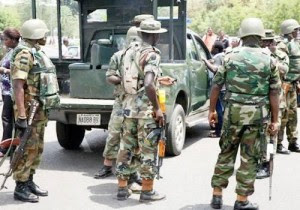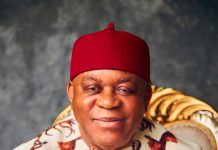By Adekunle Adekoya, General Editor
The nation’s current insecurity conundrum, epitomised by insurgency on one hand, and escalation in incidences of crimes like armed robbery, kidnapping, and assassinations leave everyone wondering just what has happened to the martial arm of society.
Nigerians, 30 years old or less may never know that the country once had a Police Force that citizens feared and respected.
Police officers holds arms to block supporters of 219 schoolgirls kidnapped by Boko Haram militants from marching on the president’s official residence in Abuja on October 14, 2014. Some 276 girls were seized from their dormitories at the Government Girls Secondary School in the remote town of Chibok in Borno state, northeastern Nigeria, on the night of April 14. AFP PHOTO
Police officers holds arms to block supporters of 219 schoolgirls kidnapped by Boko Haram militants from marching on the president’s official residence in Abuja on October 14, 2014. Some 276 girls were seized from their dormitories at the Government Girls Secondary School in the remote town of Chibok in Borno state, northeastern Nigeria, on the night of April 14. AFP PHOTO
Those were the days when truculent children giving their parents a hard time recoiled when threatened with the refrain: “Police is coming!”
Then, law and order ruled everything in Nigeria. Compared with what obtains now, traffic was orderly, while people went about their businesses with the fear of the law. In fact, whenever commercial drivers heard that men of a section of the Police, the Highway Patrol unit was on patrol somewhere, sanity prevailed on the roads while those whose vehicle papers were not in order took cover.
If two people had a quarrel that was about to degenerate into a fight, they reined themselves in if there’s a threat to call the Police. The beauty of Nigeria in the 60s, 70s, and up till the 80s was that you could go anywhere at anytime, unmolested. Our urban centres, especially Lagos and Port Harcourt had vibrant night lives; people moved from one party or club to another throughout the night without let or hindrance, while petrol stations were open all the time, running a 24-hour service. Sure, there were crimes, and there were uprisings, but the Police was up to the task. Just two examples will suffice.
The Agbekoya Uprising: The famed Agbekoya farmers’revolt took place about November 1968 to September 1969. It started as a revolt against taxes levied by the government of the defunct Western State, then under Brigadier-General Adeyinka Adebayo as military governor. The farmers, who grew the cash crop, cocoa, had their income slashed from about £120 per ton in 1965/66 season to just £65.
Then, government raised taxes, levying £3.50 per adult. Faced with dwindling income from the sale of cocoa, the farmers insisted they’ll pay just 30 shillings. Coupled with political unrest which had led to a military coup in 1966, with Chief Ladoke Akintola killed, and Chief Obafemi Awolowo in prison, the atmosphere in the region was charged, but it seemed the government was impervious to it. The farmers organized themselves to resist payment of the tax, and descended on tax officials who mounted raids against tax evasion.
To manage the situation, government used force to pacify the farmers and arrested some of their leaders. In anger, the farmers, now organized into a fearful militia attacked government structures, and as a result, many officials were killed. Court houses and government buildings were attacked, prisons stormed, while setting free thousands of prisoners alongside their jailed members in the process.
The Police was managing the situation as the Federal Government had its hands full with the civil war. A female detective went underground, infiltrated the Agbekoya leadership, and in time, became a paramour of the group’s main leader. The information she gathered in the process led to the routing of the Agbekoya leadership and put paid to the uprising. The farmers’leaders arrested included Adegoke Akekuejo, Tafa Adeoye, Folarin Idowu, Mudasiru Adeniran and Tafa Popoola. That was the Nigeria Police!
The Ejigbadero (Jimoh Ishola) Case
Another case in which the Police discharged itself splendidly was the murder case involving a Lagos socialite and land speculator, Jimoh Ishola, alias Ejigbadero, in 1975. A man, one Raji Oba was shot dead in a tussle over a parcel of land in Alimosho area of Lagos on August 22, 1975. The wife of the man told the Police that Ejigbadero was the culprit. But Ejigbadero had what could be called a cast-iron alibi. August 22, 1975, in the evening, when Raji Oba was killed, Ejigbadero was hosting guests at a party, celebrating the naming of a child born a week earlier. He was as connected as any could be then, with friends in high places both in the military and the Police and in high society, but was nevertheless arrested for the murder.
The Police cut through his alibi, thoroughly investigated the case, and charged Ejigbadero to court. A verdict of guilty was returned, and he was sentenced to death. He appealed his conviction up to the Supreme Court, which upheld the conviction in 1978. He was eventually executed in March 1979. If the Ejigbadero saga happened now, the odds are that Raji Oba’s death would probably not be thoroughly investigated while Ejigbadero would have gone scot free.
Nigerians thus wonder what had gone wrong with their Police Force whose officers and men solved cases with just their wits then, compared with now. With GSM, internet, Police trust funds, Rapid Response Squads, and more, files of unsolved cases are getting bulkier by the day. We still ask, and will continue to ask: Who killed Dele Giwa, Bola Ige, Olagbaju Odunayo, Suliat Adedeji, Marshall Harry, Bagauda Kaltho, Jerry Agbeyegbe; Funsho Williams, Godwin Agbroko, Bayo Ohu, and many more others?
Oldest state institution
The Police is the oldest institution of state in the country; its origins date back to 1861 when the Colony and Protectorate of Lagos was proclaimed by the British. Needing a martial instrument to back up the administration, a 30-man constabulary was established. 18 years later, in 1879, the Hausa Constabulary, with 1,200 men was formed. 35 years after establishment of the Lagos Constabulary, the Lagos Police was established in 1896. Before that, the Niger Coast Constabulary was formed in Calabar in 1894 under the newly proclaimed Niger Coast Protectorate.
In the north, Sir George Taubman Goldie’s Royal Niger Company set up a constabulary for itself in 1888, with headquarters at Lokoja. When the protectorates of Northern and Southern Nigeria were amalgamated in 1914, part of the Royal Niger Company Constabulary became the Northern Nigeria Police, and part of the Niger Coast Constabulary became the Southern Nigeria Police. The two Police forces were not merged until 1930, when the Nigeria Police Force was formed, with headquarters in Lagos.
Abdication: However, as Nigeria marched forth as a state, its Police Force seemed to have been abdicating its responsibilities while the state accommodated the abdication by creating parallel institutions, instead of excising the tumours of ineffectiveness and strengthening the force. Over the years, basic Police functions have been taken over by other organizations created solely for that purpose. Along the line, for instance, the Highway Patrol Unit and the Motor Traffic Division of the Police got weakened through under-funding, personnel shortage, and poor morale.
The road transport sector became riotous, while civilized use of the roads took the back bench. Motor accidents, with concomitant losses of precious lives became the order of the day. As a result, concerned citizens advocated ameliorative measures, principally aimed at restoring sanity on the roads. Thus, the Federal Road Safety Commission, FRSC, was born to perform what used to be a routine police function, managed by officers and men of the Highway Patrol and MTD.
In like manner, the Special Fraud Unit of the Police, which still exists, now has its functions duplicated with the setting up of the Economic & Financial Crimes Commission, EFCC. This is also not to forget the National Drug Law Enforcement Agency, NDLEA. Its duties used to be that of the Narcotics Division of the Police. Somebody mused recently that if the state continues with its Police in this fashion, very soon, there might have to be different bodies to handle homicides, armed robberies, and other crimes!
Restoration time for Police: The Police as an institution is in dire straits and the nation must wake up to this reality by moving to re-invigorate the force.
Relative to the population, there are not enough Policemen. For a population of about 160 million, 305,000 policemen, of which only about 260,000 are deployed, according to the Inspector-General of Police, Solomon Arase, are inadequate to secure the environment. Some towns and cities, because of their population, will need more policemen than others. Lagos, for instance, has 33,000 policemen deployed for a population of 20 million.
That averages one policeman to about 600 people. By comparison, New York City, in the USA has a population of 8.06 million, but has 34,000 uniformed officers deployed, supported by 17,000 other employees in the New York Police Department — 51,000 workers in all. That averages one policeman to 235 persons, and if the technology and infrastructure of the US is factored, effective policing is assured. Thus, the nation needs more policemen.
Having more policemen will not be enough; they must be educated, well-trained, and well-paid.
They must also be well-kitted and well-equipped. Today, it is difficult to see two policemen dressed exactly alike; regulation dressing has receded in the Police in recent times. Further, Police stations should be computerized, and equipped with the latest ICT gadgets to enable them gather, store, and retrieve information on any person or place, real time. All Police stations nationwide should be hooked to a central database connecting divisions, area commands, state commands, zonal commands, and the central IGP secretariat.








